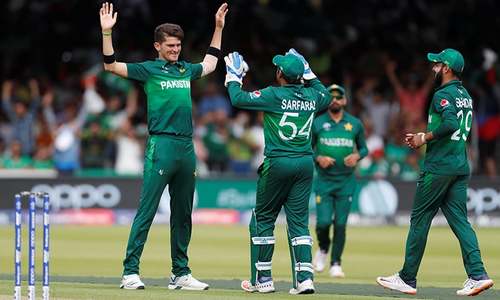Another World Cup and yet another disaster for Pakistan. The Babar Azam-led team’s top ODI ranking ahead of the global showpiece proved a mere insignia. On the ground, they were outclassed, outsmarted and outpaced.
Failing to get crowned as the world champions is, and should not be, Pakistan’s prime concern, as only one out of 10 sides will lift the coveted trophy in Ahmedabad on Nov 19, and the rest will seek resurrection.
However, the real alarm for the green-shirts is that they earned an agonising fifth spot just above Afghanistan — both equal on points; the former edging them on run-rate — at the showpiece in India where the playing conditions are very much similar to Pakistan’s.
At the 2011 World Cup, which was jointly hosted by India, Sri Lanka and Bangladesh, Pakistan had made it to the last four.
The 2015 (Australia and New Zealand) and 2019 (England) editions were abject failures for Pakistan. A plain justification for these flops, though carrying slight weight, could be the playing conditions in these countries favour Pakistan less than other contestants like Australia, England, New Zealand and South Africa.
However, how can the Pakistan Cricket Board (PCB), Babar, Mickey Arthur and his coaching staff justify — with solid rationale — the never-seen-before catastrophe Pakistan underwent at the ongoing World Cup?
So, who in the end is to be blamed? Logic says, primarily it is the authorities who have been running the affairs. The PCB has seen three chairmen — Ramiz Raja, Najam Sethi and Zaka Ashraf — during the past couple of years and therefore the country’s richest sports body has lacked consistency in proper management of the game. History shows that a change in Pakistan’s political landscape is bound to alter the country’s cricket administration. Has it worked to benefit or damage the game?
Drastic transformations – back and forth — in the domestic structure by various PCB regimes since 2019 when departments were abolished have kept Pakistan cricket topsy-turvy. How can players and institutions concerned develop smoothly when the way forward is uncertain due to frequent changes at the helm? Moreover, ad-hoc arrangements in the PCB since December, instead of having an appropriately elected set-up in place, have done no good to Pakistan cricket.
Talking of the incumbent PCB Interim Management Committee led by Zaka, some contentious issues off the field, including the months-old deadlock between the PCB and the national team over finalising the central contracts, haunted the players a bit more than expected during the World Cup.
Needless to say, the Board, considering the World Cup was so close, could have fared much better in this regard.
The reported controversy over a communication breakdown between Zaka and Babar during the global event acted as the last straw, and the team’s crash in India was a matter of time.
On the field, the inordinately late induction of Abdullah Shafique truly reflects PCB’s sorry state of affairs. The compact opener ended the current World Cup as Pakistan’s second-highest scorer (336 runs, average 42.00) behind Mohammad Rizwan (395). The right-hander, one intensely feels, should have been readied for the ODI set-up a little earlier.
A number of game-related developments plagued the Pakistan team before and during the World Cup campaign. A stunning collapse at the Asia Cup during which saw injuries hit pacers Naseem Shah (who was later ruled out of the global event) and Haris Rauf followed by some extremely disputed selections for the World Cup, particularly those of Shadab Khan and Mohammad Nawaz, had slashed Pakistan fans’ hopes considerably even before the start of the global event.
A major chunk of responsibility in this entire scenario can surely be attributed to weak decision-making and planning of different PCB administrations over the years.
Pointing fingers at Babar’s captaincy for Pakistan’s crash in the World Cup sounds justified but to a certain extent. One feels it is the faulty system, not a particular individual, which badly damaged the team at the 2015 and 2019 editions also.
Still, Babar being the team’s captain in no way can be absolved of all the blame. His leadership skills and game awareness kept coming under the spotlight throughout the World Cup, mostly for some very obvious and valid reasons. He is expected to ponder seriously whether he, for Pakistan cricket and his own progress, would keep the reins and for how long after captaining the national team in all formats during the past three, four years.
Last but not the least, the role of Pakistan team’s backroom staff needs clarity. First and foremost Arthur, the team’s ‘distant’ director, requires re-orientation as to whether and how in this modern era of professionalism he can continue to hold a key position while remaining far away and simultaneously coaching Derbyshire.
While Robert Key, the managing director of defending champions England, swiftly took responsibility for the disastrous show by Jos Buttler-led side that finished a miserable seventh, the question is whether any stakeholder in Pakistan cricket will show similar courage.
For Pakistan, a World Cup victory has remained elusive since 1992. If we really want to change this history in future editions, all the stakeholders must look inward, think and act selflessly, in order to initiate a long-term change. One Robert Key-like admission in this regard would be highly beneficial for the country and the sport.
Published in Dawn, November 15th, 2023














































Dear visitor, the comments section is undergoing an overhaul and will return soon.